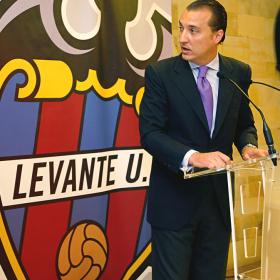
The most appealing story in Spanish football this season so far has been the almost unbelievable success of Levante. The heart-warming tale of the little side on a shoestring budget socking it to La Liga’s all-conquering duopoly was catnip for the Spanish and global media – with even The New York Times sending a reporter to find out what was going on.
A run of seven successive wins including 1-0 over Real Madrid and 3-0s against both big-spending Málaga and local rivals Villarreal lifted Levante to be the shock leader of the Primera División (until last weekend). The little Valencia-based club has only been in Spain’s top division for seven of its 102 years and has never won a major trophy. The financial disparities within La Liga – Levante’s annual budget is €22 million, compared to Barcelona’s €461 million – made the story even more fantastic.
A lot of the praise for this achievement went to coach Juan Ignacio Martínez, and even more to the players, a motley mix of aging cast-offs and never-weres (the side fielded against Málaga was the oldest in La Liga history). However, perhaps the man whose reputation has been most burnished by Levante’s unprecedented success is club president Francisco ‘Quico’ Catalán.
Catalán is not your typical La Liga president. At only 35 years old, he’s younger than some of his players. He does not own the club, but was invited to take charge by the foundation which now owns the majority of Levante’s shares. His salary is reportedly significantly less than other La Liga club presidents. In a league where chancers (and worse) from Atlético Madrid’s Jesus Gil y Gil to Barcelona’s Joan Laporta and Sevilla’s José del Nido regularly bring negative publicity and even shame to their clubs, the fresh-faced and perfectly groomed Catalán seems to be genuinely liked and admired by both fans and journalists.
Much of this admiration stems from the size of the challenge Catalán faced when he took control of the club less than three years ago. It had been recently relegated, was in total disarray on and off the pitch, and was €90 million in debt after spectacular mismanagement (or worse) under previous owner Pedro Villarroel (for whom Catalán had worked). Players had gone on strike over €18 million owed in back-wages. Even in the often surreal world of Spanish football finances, Levante stood out as a basket-case.
Catalán unsurprisingly made good use of Spain’s Ley Concursal, which allows clubs to avoid paying creditors and keep playing matches, and worked at cutting costs and improving processes behind the scenes. In September 2010 he promised to pay creditors back €3 million a year if they would accept less than the full sums owed. That cut the club’s debts to a more manageable €60 million. He also introduced plans to make the club debt-free by 2014 by selling their current Ciutat de Valencia ground and moving into a smaller, more practical new stadium.
This approach has been successful. While many La Liga clubs continue to operate massive deficits, Levante’s accounts for 2010/11 actually showed a €2-million surplus. In three years the wage bill has been cut from €16 million to €6.5 million. Canny transfer dealings have also helped. The team which topped La Liga was assembled on the cheap – with total spending on new players last summer totalling only €210,000 – apart from the €1 million paid to Manchester City for forward Felipe Caicedo, although in a typically astute move he was immediately sold to Lokomotiv Moscow for a €6.5-million profit.
Catalán’s choice of coaches has also been particularly inspired. The previously little-known Luis García led the team back to the Primera División in 2009/10 and then kept them safe last season. When García was poached by Getafe in the summer, Catalán ensured Levante got €1 million in compensation. He then surprisingly moved for Martínez, whose 14 years of management at eight different lower division clubs gave little advance warning of this season’s success.
A president of many parts
While overseeing this remarkable turnaround in Levante’s fortunes, Catalán has also been busy elsewhere. In April he was elected unopposed as vice-president of the Liga de Fútbol Profesional (LFP) and he played a prominent role in the negotiations which settled August’s La Liga players’ strike. In September he publicly turned down an invitation from Del Nido to attend a meeting to discuss a more equal sharing out of Spanish football’s TV rights. This decision led the local edition of La Vanguardia newspaper to label Catalán the LFP’s “Sheriff de Sherwood” and wonder if his political ambitions were leading him to take positions unfavourable to his own club.
Catalán is also involved in politics of the more conventional kind. Valencia’s Partido Popular mayor Rita Barberá has helped make his property plans more viable by rezoning the land on which Levante’s current stadium sits. Last month, in the midst of the team’s unbeaten run, Catalán attended the launch of a new book by Esteban González Pons, who heads the PP’s list of candidates in Valencia for this month’s general election.
Sunday’s 2-0 defeat at Osasuna dropped Levante to third position, behind Madrid and Barcelona, and the team are likely to slip further down the table in the coming weeks. Spanish football’s financial hierarchy cannot be completely disregarded for long. The small club’s ambitious young president, however, looks destined for bigger things.
So the way out of the financial problem of the club is the usual PP way of doing it, corruption and a pelotazo by rezoning the stadium land. What a surprise!
Hi Graham,
I’m not sure about corruption, but yeah the property angle / solution is depressingly common for La Liga clubs in trouble. Reminds me of home (Ireland)…
Dermot